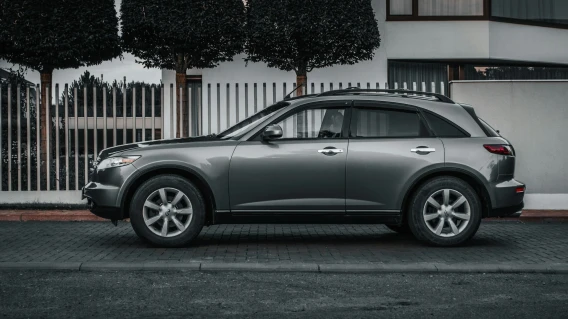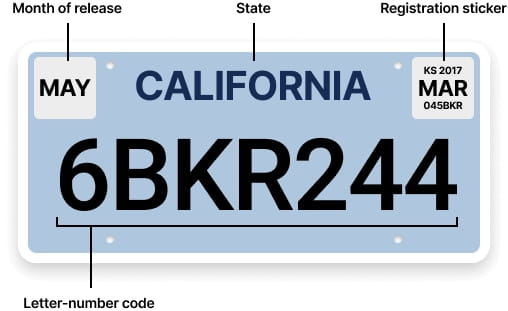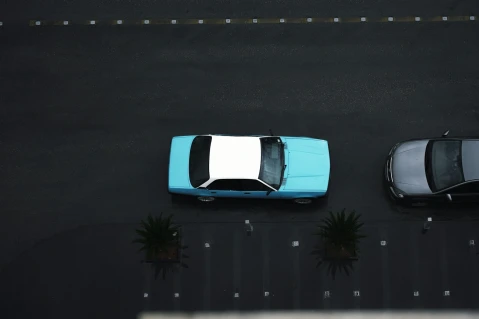
Los 10 nuevos SUV más económicos para comprar
El segmento de los SUV subcompactos se ha expandido rápidamente a medida que l...
Usted puede comprobar cualquier matrícula de California en línea y obtener información del vehículo sobre el mismo
Búsqueda del VIN
Aquí lo puedes encontrar:

¿Estás seguro de que el coche que estás mirando es una buena compra? Aunque a primera vista parezca estupendo, podría ocultar daños o tener problemas legales que podrían impedirle ponerlo a su nombre. Nuestra herramienta de búsqueda de matrículas de California puede ayudarte a evitar coches con un historial dudoso. Los registros de vehículos del DMV de California incluyen el número de matrícula de California, el VIN y otra información que podemos utilizar para encontrar registros públicos relacionados. Usando esta información, nuestro sitio construye un historial de registro que tiene la misma información que nuestra búsqueda de propietarios de vehículos. ¿Listo para comprar? Solicite un informe del historial del vehículo y crearemos un historial completo del vehículo, incluidos los cambios de titularidad, los registros judiciales, los embargos y las reclamaciones al seguro. Con esta información, puede comprar con confianza.
El Estado Dorado emite matrículas para una amplia gama de vehículos, incluyendo vehículos de pasajeros, vehículos comerciales, motocicletas, maquinaria agrícola, ciclomotores y remolques. Mientras que en la mayoría de los estados los propietarios tienen que transferir las matrículas de un vehículo a otro, el sistema de California mantiene las matrículas con el vehículo durante toda su vida útil. El estado tiene incluso programas para mantener placas de décadas de antigüedad con vehículos antiguos.
Para matricular un vehículo en California, necesitas un título firmado y pagar las tasas de transferencia del título y los impuestos de uso aplicables. Estas tasas varían de un condado a otro. Los coches de gasolina con más de cuatro años de antigüedad también necesitan un certificado smog. Si compra un vehículo a un concesionario, éste debe obtener el certificado smog antes de vendérselo, a menos que ya lo haya obtenido hace menos de 90 días.
Las matrículas deben renovarse cada año. Aunque las matrículas pueden transferirse a diferentes vehículos, normalmente permanecen con el vehículo durante toda su vida. Si las matrículas se pierden o se estropean, se vuelven a expedir nuevas matrículas con el mismo número. Si se trata de un diseño de vanidad más antiguo, se emitirá una nueva placa estándar en su lugar. En circunstancias normales, las matrículas pueden utilizarse hasta 1964. Bajo el programa Año del Fabricante (YOM), incluso las placas más antiguas pueden ser utilizadas en vehículos antiguos.
Las placas estándar para automóviles, vehículos comerciales y remolques utilizan 7 caracteres, mientras que las placas para motocicletas y otros vehículos utilizan 6 caracteres. Hay dos tipos de placas de vanidad de California: placas de caridad y placas especiales. Las placas de matrícula personalizadas pueden tener de 2 a 7 caracteres, mientras que las placas benéficas y especiales tienen espacio para un máximo de 6 caracteres. Todas las placas de motocicleta de vanidad tienen espacio para 5 caracteres. El programa Año de Fabricación (YOM) permite a los propietarios registrar vehículos modelo 1969 y anteriores con placas antiguas de California.

¿Cómo podemos buscar información sobre un vehículo basándonos únicamente en un número de matrícula? Cuando los vehículos se matriculan en California, esa información pasa a formar parte del registro público. Este registro también incluye el modelo y el número de bastidor. Nuestro motor de búsqueda utiliza esto para encontrar registros oficiales y crear un historial de matriculación. Si solicitas un informe completo, utilizamos esta información para buscar en los registros gubernamentales y de seguros y crear un historial completo del vehículo.
La información del propietario del vehículo está protegida en todo Estados Unidos por la Ley de Protección de la Privacidad del Conductor (DPPA), Estatuto Federal 18 USC 2721. Esto impide el acceso público de cualquier información personal en su vehículo o registros de licencia de conducir, incluyendo números de seguro social, números de licencia de conducir, nombres, direcciones y números de teléfono, así como cualquier discapacidad o información médica. El Código de Vehículos de California también protege las fotografías, las direcciones de correo electrónico y la información sobre seguros que pueda formar parte de su registro de vehículos. La única información de identificación que se hace pública es el nombre y los apellidos de los propietarios anteriores. Nuestras herramientas de comprobación de matrículas y números de bastidor del DMV sólo le muestran la información que está legalmente autorizado a ver.
Existen excepciones a estas normas para usos específicos, como retiradas de vehículos, asuntos gubernamentales, incautación de vehículos y verificación de información personal para seguros y trabajos de conducción profesional. También puedes dar tu consentimiento por escrito a terceros para que accedan a esta información.
Al solicitar un informe completo de matrículas de California, obtendrá información extraída de bases de datos federales, estatales y corporativas. Esto es lo que aprenderá de uno de estos informes:
Esto incluye registros de ventas, historial de títulos, registros de gravámenes, información de registro y especificaciones de fábrica. Esto le permite verificar que la lista de ventas coincide con el vehículo, y que no tiene préstamos pendientes o problemas de título que podrían impedirle registrar el vehículo.
¿Le preocupa comprar un coche que tenga daños ocultos por accidente o un título lavado? Esta parte del informe cubre las marcas del título, las llamadas a revisión, las discrepancias en el cuentakilómetros y la información de mantenimiento. De esta forma, podrás mantenerte alejado de coches que hayan sufrido un siniestro total en otro estado o que puedan tener problemas de seguridad o mecánicos.
Aunque esto no le dirá información sobre el coche directamente, puede decirle cómo fue tratado el vehículo, y donde puede haber lagunas en otros registros. Esta sección incluye accidentes, infracciones de tráfico, suspensión de la licencia, matrículas caducadas, números de referencia de renovación (RRN), multas y condenas. Esto te ayuda a evitar coches que fueron utilizados para carreras callejeras, o que pueden tener daños no declarados por accidentes.
Estos registros incluyen arrestos por DUI y DWI, órdenes de arresto y más. Al igual que los registros de los tribunales de tráfico, esto no le dice sobre el coche directamente. Sin embargo, le da una idea de cómo el vehículo fue tratado por los propietarios anteriores.
Sí. De hecho, puedes obtener un informe de cualquier coche usado de Estados Unidos utilizando nuestra búsqueda de matrículas, no solo de California. Esto te proporciona la misma información que nuestra búsqueda de VIN.
Los números de matrícula se utilizan para identificar vehículos en una variedad de bases de datos oficiales. Nuestro sistema de búsqueda recopila información de estas bases de datos para crear un informe. Nuestras herramientas de búsqueda se ajustan a todas las leyes aplicables, por lo que sólo se le mostrarán los datos que está legalmente autorizado a ver.
Sí. Nuestros informes excluyen automáticamente la información restringida por la Ley de Protección de la Privacidad del Conductor (DPPA), así como las leyes estatales y locales. Para acceder a esta información protegida, debe tener autorización legal o consentimiento por escrito del propietario del vehículo.
Descubra consejos de expertos, sugerencias y noticias sobre la compra y el mantenimiento de vehículos usados.

El segmento de los SUV subcompactos se ha expandido rápidamente a medida que l...

¿Qué implica comprar un coche usado con título reconstruido? En este artículo...

Vea cómo averiguar cuáles son las mejores métricas para comparar automóviles